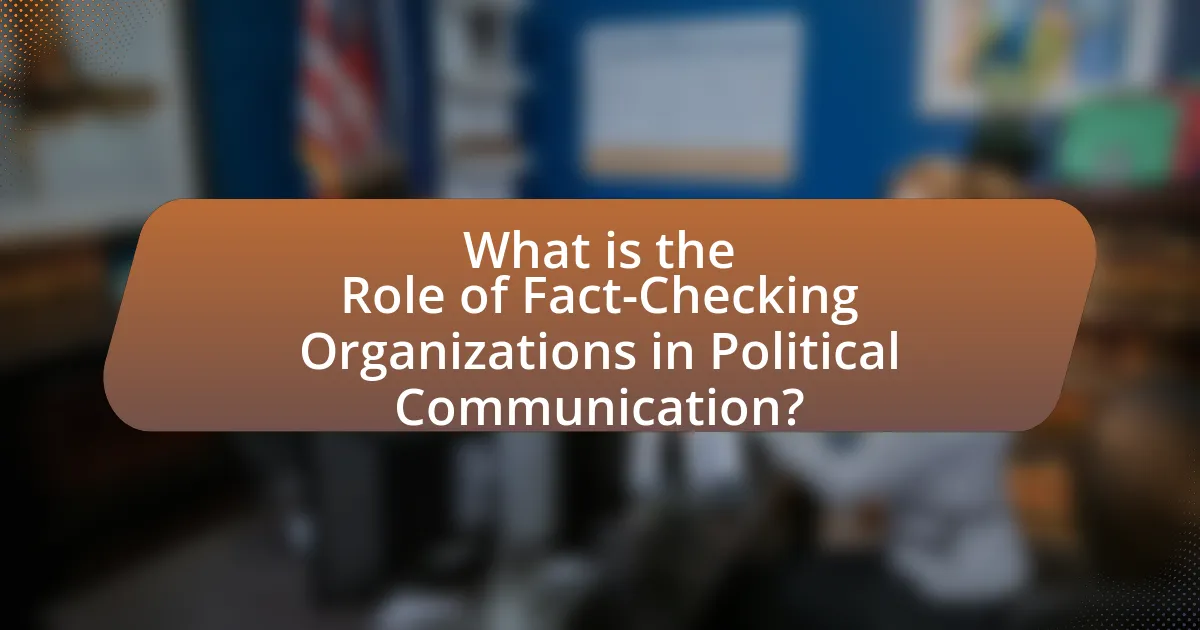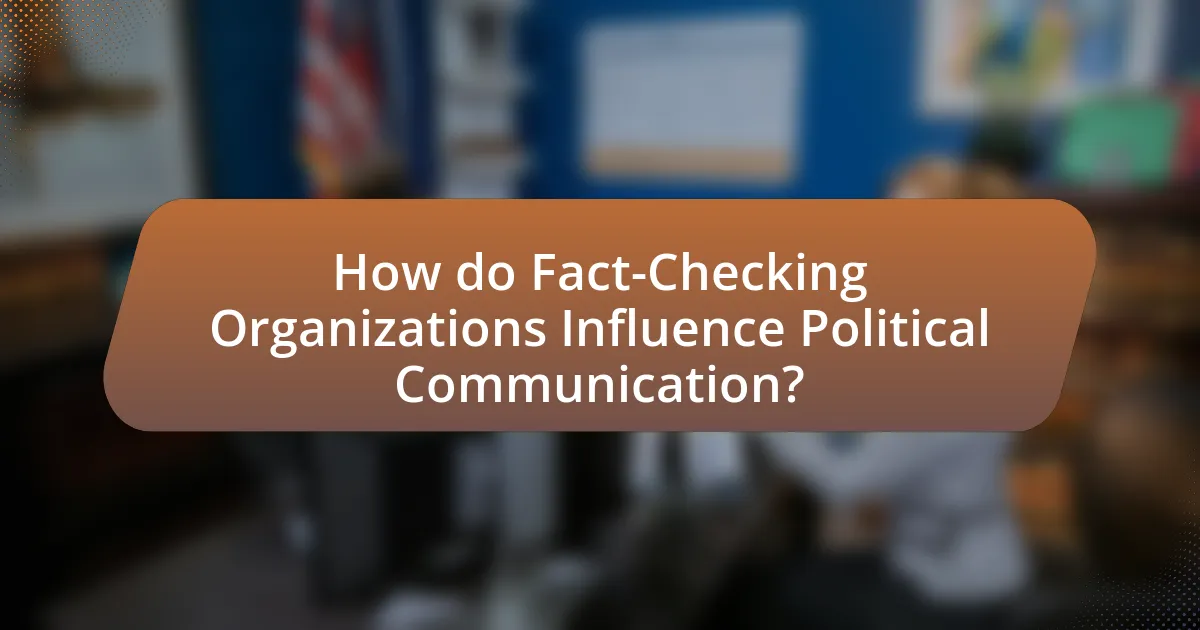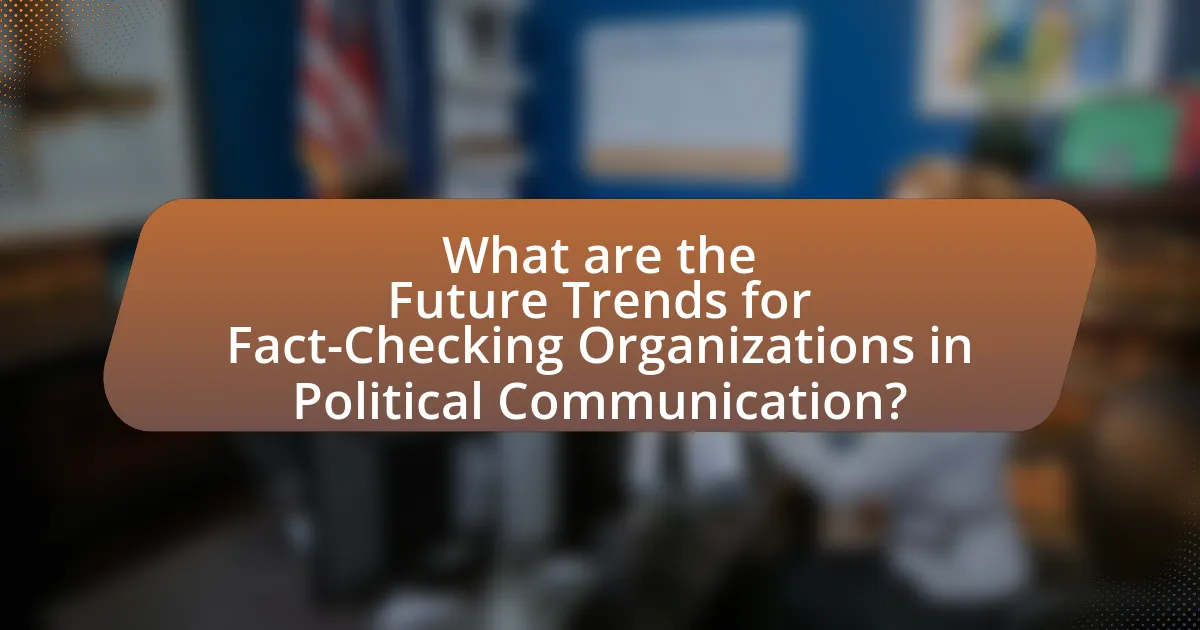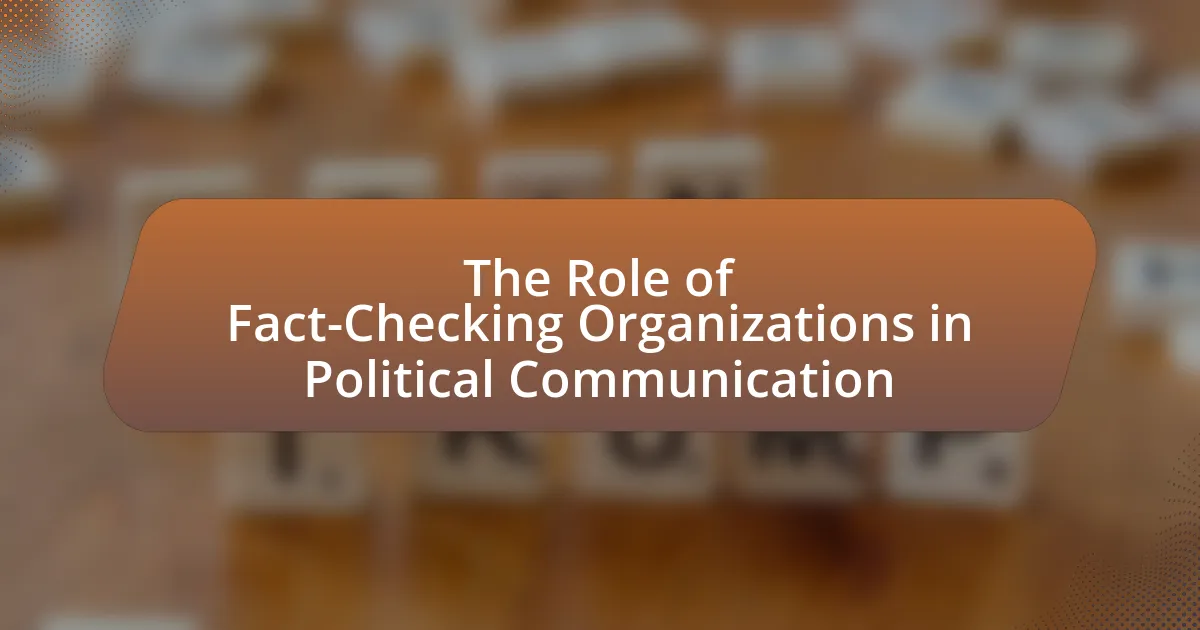Fact-checking organizations are essential entities in political communication, tasked with verifying the accuracy of statements made by public figures and media outlets. They combat misinformation and promote informed public discourse, particularly evident during significant events like the 2020 U.S. presidential election. The article explores the operational processes of these organizations, their impact on public opinion and accountability, the challenges they face, and the evolving role of technology in enhancing their effectiveness. It also discusses best practices for maintaining credibility and the importance of collaboration with media and technology platforms to improve the dissemination of accurate information.

What is the Role of Fact-Checking Organizations in Political Communication?
Fact-checking organizations play a crucial role in political communication by verifying the accuracy of statements made by public figures and media outlets. These organizations help to combat misinformation and disinformation, thereby promoting informed public discourse. For instance, during the 2020 U.S. presidential election, organizations like PolitiFact and FactCheck.org assessed claims made by candidates, providing evidence-based evaluations that informed voters. Their work is essential in maintaining accountability among politicians and fostering transparency in the political process.
How do fact-checking organizations operate within political communication?
Fact-checking organizations operate within political communication by verifying claims made by politicians, political parties, and media outlets to ensure accuracy and accountability. These organizations employ a systematic process that includes researching statements, consulting experts, and using reliable sources to assess the truthfulness of claims. For instance, organizations like PolitiFact and FactCheck.org utilize a rating system to categorize statements based on their accuracy, providing transparency and context to the public. This process not only informs citizens but also holds political figures accountable, as evidenced by studies showing that fact-checking can influence public perception and behavior during elections.
What processes do fact-checking organizations use to verify information?
Fact-checking organizations use a systematic process to verify information, which typically includes sourcing claims, cross-referencing with credible sources, and assessing the context. Initially, they identify the claim being made and gather relevant evidence from reliable sources such as academic studies, official documents, and expert opinions. Following this, they compare the claim against the gathered evidence to determine its accuracy. Additionally, fact-checkers evaluate the context surrounding the claim to ensure a comprehensive understanding. This methodical approach is supported by the International Fact-Checking Network’s Code of Principles, which emphasizes transparency, fairness, and accountability in the verification process.
How do fact-checking organizations source their information?
Fact-checking organizations source their information through a combination of primary and secondary sources, including official documents, expert interviews, and reputable news outlets. They often verify claims by cross-referencing data from government reports, academic studies, and credible databases to ensure accuracy. For instance, organizations like PolitiFact and FactCheck.org utilize a systematic approach that includes sourcing information from legislative records, court documents, and statements made by public officials, which are then analyzed for factual accuracy. This rigorous methodology helps maintain credibility and reliability in their fact-checking processes.
Why are fact-checking organizations important in political discourse?
Fact-checking organizations are important in political discourse because they enhance the accuracy of information disseminated to the public. By verifying claims made by politicians and media, these organizations help to combat misinformation, which can distort public understanding and influence democratic processes. For instance, a study by the Pew Research Center found that 64% of Americans believe that fact-checking helps them understand the truth about political issues. This demonstrates that fact-checking organizations play a crucial role in promoting informed citizenry and accountability in political communication.
What impact do fact-checking organizations have on public opinion?
Fact-checking organizations significantly influence public opinion by enhancing the accuracy of information consumed by the public. These organizations systematically verify claims made by public figures and media, thereby reducing the spread of misinformation. Research indicates that exposure to fact-checking can lead to changes in beliefs, particularly when individuals encounter corrections that challenge their pre-existing views. For instance, a study published in the journal “Political Communication” by Nyhan and Reifler (2010) found that fact-checking can effectively reduce misperceptions among individuals who initially hold false beliefs. This demonstrates that fact-checking organizations play a crucial role in shaping informed public discourse and fostering accountability among political actors.
How do fact-checking organizations contribute to accountability in politics?
Fact-checking organizations contribute to accountability in politics by verifying the accuracy of statements made by public officials and political entities. These organizations analyze claims, provide evidence-based assessments, and publicly report their findings, which helps to inform the electorate and hold politicians accountable for misinformation. For instance, during the 2020 U.S. presidential election, organizations like PolitiFact and FactCheck.org evaluated thousands of statements, revealing that a significant percentage of claims made by candidates were misleading or false. This transparency fosters a more informed public, encourages political figures to be truthful, and enhances the overall integrity of political discourse.
What challenges do fact-checking organizations face?
Fact-checking organizations face several significant challenges, including resource limitations, the rapid spread of misinformation, and political bias. Resource limitations hinder their ability to thoroughly investigate claims, as many organizations operate with limited funding and staff. The rapid spread of misinformation, particularly on social media platforms, complicates their efforts to keep pace with false narratives that can go viral before they can be addressed. Additionally, political bias can undermine their credibility, as some audiences may perceive fact-checking as partisan, leading to distrust in their findings. These challenges are documented in studies such as the Pew Research Center’s report on misinformation, which highlights the difficulties faced by fact-checkers in an increasingly polarized media landscape.
How do misinformation and disinformation affect fact-checking efforts?
Misinformation and disinformation significantly hinder fact-checking efforts by creating an overwhelming volume of false claims that fact-checkers must sift through. This influx complicates the verification process, as fact-checkers must allocate resources to identify and debunk misleading information, which can lead to delays in addressing critical issues. According to a study by the Pew Research Center, 64% of Americans believe that misinformation has a major impact on public discourse, illustrating the challenge fact-checkers face in maintaining accuracy and credibility in an environment saturated with falsehoods.
What are the limitations of fact-checking organizations?
Fact-checking organizations face several limitations, including resource constraints, potential biases, and the challenge of addressing misinformation in real-time. Resource constraints often limit the number of claims that can be fact-checked, leading to selective coverage. Additionally, biases may arise from the affiliations or perspectives of the organizations, which can affect their impartiality. The rapid spread of misinformation on social media platforms complicates timely responses, making it difficult for fact-checkers to keep pace with false claims. These limitations can hinder the overall effectiveness of fact-checking in promoting informed public discourse.

How do Fact-Checking Organizations Influence Political Communication?
Fact-checking organizations influence political communication by verifying claims made by politicians and media, thereby promoting accountability and informed public discourse. These organizations assess the accuracy of statements, which can lead to corrections in the public narrative and discourage the spread of misinformation. For instance, a study by the Pew Research Center found that fact-checking can significantly impact public perception, with 60% of respondents stating that they trust information from fact-checkers. Additionally, when politicians are publicly fact-checked, they often adjust their messaging to align with verified information, demonstrating the organizations’ role in shaping political dialogue.
What role do fact-checking organizations play in media reporting?
Fact-checking organizations play a crucial role in media reporting by verifying the accuracy of information disseminated by news outlets and public figures. These organizations assess claims made in the media, providing evidence-based evaluations that help to clarify misinformation and promote accountability. For instance, a study by the Pew Research Center found that fact-checking can significantly influence public perception, as audiences are more likely to trust media sources that engage in rigorous fact-checking practices. By identifying falsehoods and providing context, fact-checking organizations enhance the credibility of media reporting and contribute to informed public discourse.
How do journalists collaborate with fact-checking organizations?
Journalists collaborate with fact-checking organizations by sharing information and resources to verify claims made in news stories. This collaboration often involves journalists submitting specific statements or articles to fact-checkers for analysis, which helps ensure accuracy and credibility in reporting. For instance, during election cycles, journalists frequently rely on fact-checking organizations to assess the veracity of political statements, thereby enhancing the quality of their reporting. This partnership not only aids in correcting misinformation but also fosters public trust in the media by demonstrating a commitment to factual accuracy.
What are the effects of fact-checking on news coverage?
Fact-checking significantly enhances the accuracy and credibility of news coverage. By systematically verifying claims made by public figures and media outlets, fact-checking organizations help to reduce the spread of misinformation. A study by the Pew Research Center found that news articles that included fact-checking were more likely to present accurate information and were perceived as more trustworthy by audiences. Furthermore, fact-checking can lead to greater accountability among journalists and public officials, as it encourages them to provide evidence-based information. This process not only informs the public but also fosters a more informed electorate, ultimately contributing to healthier democratic discourse.
How do fact-checking organizations engage with the public?
Fact-checking organizations engage with the public primarily through transparency, accessibility, and educational initiatives. They provide clear explanations of their methodologies and sources, allowing the public to understand how claims are evaluated. For instance, organizations like PolitiFact and FactCheck.org publish detailed reports on their findings, which include citations and links to original sources, fostering trust and credibility. Additionally, they utilize social media platforms to disseminate information quickly and interactively, enabling real-time engagement with audiences. Research indicates that such engagement strategies enhance public awareness and understanding of misinformation, as seen in studies conducted by the Pew Research Center, which highlight increased public interest in fact-checking during election cycles.
What strategies do fact-checking organizations use to reach audiences?
Fact-checking organizations use various strategies to effectively reach audiences, including social media engagement, partnerships with media outlets, and the use of interactive tools. Social media platforms allow these organizations to disseminate information quickly and engage directly with users, increasing visibility and reach. Collaborations with established media outlets enhance credibility and provide a broader audience base, as seen in partnerships like those between PolitiFact and major news networks. Additionally, interactive tools such as mobile apps and websites that allow users to check facts in real-time make the information more accessible and user-friendly, thereby encouraging audience participation and trust in the fact-checking process.
How do social media platforms impact the dissemination of fact-checked information?
Social media platforms significantly enhance the dissemination of fact-checked information by providing rapid and widespread access to verified content. These platforms facilitate the sharing of fact-checks from organizations, allowing users to quickly spread accurate information to their networks. For instance, a study by the Pew Research Center found that 64% of Americans believe social media is a key source for news, which includes fact-checked articles. Additionally, social media algorithms can prioritize content from reputable fact-checking organizations, increasing visibility and engagement with accurate information. This dynamic helps counter misinformation by amplifying credible sources, thereby influencing public discourse and political communication.

What are the Future Trends for Fact-Checking Organizations in Political Communication?
Future trends for fact-checking organizations in political communication include increased collaboration with technology platforms, enhanced use of artificial intelligence for automated fact-checking, and a greater focus on transparency and accountability. As misinformation continues to proliferate, fact-checking organizations are likely to partner with social media companies to improve the visibility of verified information, as seen in initiatives like Facebook’s third-party fact-checking program. Additionally, advancements in AI are enabling faster processing of claims, allowing organizations to respond more swiftly to emerging misinformation. Transparency in methodologies and funding sources is becoming essential for maintaining public trust, as evidenced by the rise of organizations that openly share their fact-checking processes and data. These trends indicate a shift towards more integrated, efficient, and trustworthy fact-checking practices in the political communication landscape.
How is technology shaping the future of fact-checking?
Technology is significantly shaping the future of fact-checking by enhancing the speed and accuracy of information verification. Automated tools, such as artificial intelligence and machine learning algorithms, are increasingly being utilized to analyze vast amounts of data and identify misinformation in real-time. For instance, platforms like ClaimBuster and FactCheck.org employ AI to scan social media and news articles, flagging potentially false claims for further review. This technological advancement allows fact-checking organizations to respond more swiftly to the rapid spread of misinformation, which is crucial in the context of political communication where timely accuracy is essential. Additionally, the integration of blockchain technology is being explored to create transparent and verifiable sources of information, further bolstering the credibility of fact-checking efforts.
What role does artificial intelligence play in fact-checking processes?
Artificial intelligence plays a crucial role in fact-checking processes by automating the verification of claims and enhancing the efficiency of fact-checking organizations. AI algorithms analyze vast amounts of data, cross-reference information from reliable sources, and identify inconsistencies in statements made by public figures. For instance, AI tools can process news articles, social media posts, and official documents in real-time, significantly reducing the time required for human fact-checkers to verify information. Research from the Pew Research Center indicates that AI can improve accuracy by flagging potential misinformation, allowing fact-checkers to focus on more complex cases that require human judgment.
How can fact-checking organizations adapt to evolving misinformation tactics?
Fact-checking organizations can adapt to evolving misinformation tactics by employing advanced technology, enhancing collaboration, and continuously updating their methodologies. Utilizing artificial intelligence and machine learning allows these organizations to analyze large volumes of data quickly, identifying patterns and trends in misinformation. For example, a study by the Pew Research Center found that 64% of Americans believe that social media platforms have a significant role in spreading misinformation, highlighting the need for fact-checkers to monitor these platforms actively. Additionally, partnerships with tech companies and other media organizations can facilitate information sharing and resource pooling, enabling a more robust response to misinformation. Regular training and updates on emerging tactics ensure that fact-checkers remain informed and effective in their roles.
What best practices can fact-checking organizations adopt for effectiveness?
Fact-checking organizations can adopt several best practices for effectiveness, including establishing clear methodologies, ensuring transparency in their processes, and collaborating with other organizations. Clear methodologies allow fact-checkers to systematically evaluate claims, which enhances credibility; for instance, the International Fact-Checking Network (IFCN) outlines principles that promote rigorous standards. Transparency in processes, such as disclosing sources and reasoning, builds trust with the audience, as seen in organizations like PolitiFact, which provides detailed explanations for their ratings. Collaboration with other fact-checkers and media outlets can amplify reach and resources, exemplified by the partnership between various fact-checking organizations during major elections to combat misinformation collectively.
How can fact-checking organizations improve their credibility and trustworthiness?
Fact-checking organizations can improve their credibility and trustworthiness by implementing transparent methodologies and adhering to rigorous standards of accuracy. Transparency in their processes allows the public to understand how claims are evaluated, which builds trust. For instance, organizations like PolitiFact and FactCheck.org publish their sources and reasoning behind their verdicts, enabling users to verify the information independently. Additionally, maintaining a consistent and unbiased approach in their evaluations, as demonstrated by the International Fact-Checking Network’s Code of Principles, reinforces their reliability. Regularly updating their findings and correcting errors promptly also enhances their reputation, as seen in the practices of reputable organizations that prioritize accountability.
What collaborative efforts can enhance the impact of fact-checking organizations?
Collaborative efforts that can enhance the impact of fact-checking organizations include partnerships with media outlets, academic institutions, and technology platforms. These collaborations allow fact-checkers to access a broader audience, share resources, and utilize advanced technologies for data analysis. For instance, a study by the Duke Reporters’ Lab found that partnerships between fact-checkers and news organizations significantly increased the visibility and credibility of fact-checking efforts, leading to a 30% rise in audience engagement. Additionally, collaboration with social media platforms enables fact-checkers to flag misinformation in real-time, thereby reducing the spread of false information.
